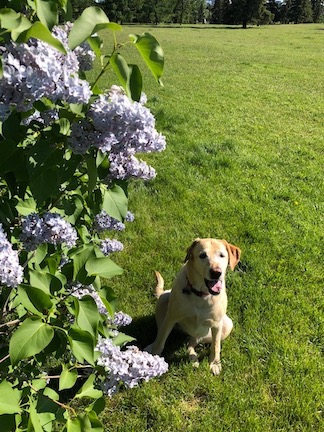
Greetings. I hope everyone’s June is going well. Things are very green here now and in bloom. My book assistant, at left, and I are especially enjoying the lilac bushes in the park. Don’t you love the smell? So far these past couple of weeks I’ve been completing some wacky books, not really wacky per se but books outside my normal reading zone. Do you ever do that — finish several outside your usual reading genre — and you think oh that was different.
I didn’t exactly plan to read them, they just came to me like that from the library. One was sort of a motivational book, another was from a movie actor, another was sort of a romance-y novel, and one was a pivotal holocaust memoir. Talk about varied, these jumped some hoops for me but served their purpose as well … so I’ll leave you with some thoughts about them below.
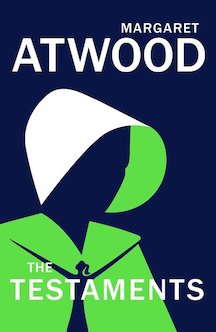
But first the latest in book news is that I scored some tickets to hear Margaret Atwood speak when she comes to town to talk about her new novel in late September. I think the event sold out in a couple hours, so I was lucky to get two seats. She’s like royalty in Canada so you must move quickly … and I mean quickly.
As you know, her new novel “The Testaments” — due out Sept. 10 — is the long-awaited sequel to her dystopian novel “The Handmaid’s Tale” from 1985. It takes place 15 years after the end of “The Handmaid’s Tale” and will feature the “explosive testaments of three female narrators from Gilead.” Gulp.
Meanwhile, Season 3 of “The Handmaid’s Tale” TV series has started up … though I stopped watching after Season 1. It was just too grim and I needed all the handmaids to escape pronto. Season 1 featured the story in the novel, but the other seasons have gone beyond that. So I will wait for “The Testaments” to come out in September. And now for the reviews:
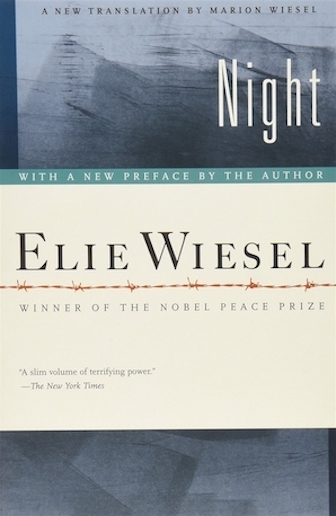
I first read Elie Wiesel’s 1958 memoir “Night” when I was in junior high school and I’m sure it blew me out of my shoes, just the sheer terror of it. But it had been a long time and I was foggy about its details, so when I saw the audio download available at the library, I started it with trepidation. It seemed timely as the 75th anniversary of D-Day was approaching then, and who better than the late Holocaust survivor Elie Wiesel to put what was at stake into context. Gulp.
Who remembers that it was so late in the war — 1944 — when Wiesel, his family, and fellow Jewish villagers from Transylvania were rounded up and deported to the concentration camp of Auschwitz-Birkenau. I wish they had run away sooner, but Wiesel says many still did not believe it would happen to them, or they thought the war would end before then. They either did not believe the death accounts or thought they could avoid them. Elie was just 15 years old when he arrived at Auschwitz (as was Anne Frank incidentally), he and his father were selected for forced labor, while his mother and one sister went to the gas chambers, two other sisters survived.
Much of this slim book tells of Elie and his father’s days at the camp, struggling to survive many months of hard labor with hardly anything to eat. The scenes of torture, camp dentistry, and the hanging of a child shape them in unimaginable ways. Finally with the Allies getting close, the SS decides to abandon the camp and force Elie, his father, and the remaining inmates on a death march first to Gleiwitz, some 50 miles away, then to be put on a train to Buchenwald, where Elie somehow manages to keep alive until the camp’s liberation on April 11, 1945.
Oh it’s not an easy book to revisit — the death march and ending are particularly horrifying and tragic — but it seemed necessary to return to this account of what the Wiesel family experienced and millions of others. I had not recalled how unsparing Elie Wiesel is of himself and others in the camp about when they failed to help those in need, despite their very desperate conditions. The destruction of the beliefs in humanity and God and the self and soul are all in this one memoir. It’s downright shattering, even surmising what’s coming the second time around.
By the way I have not read Elie Wiesel’s two other books in this trilogy: “Dawn” and “Day,” but I plan to in the future.
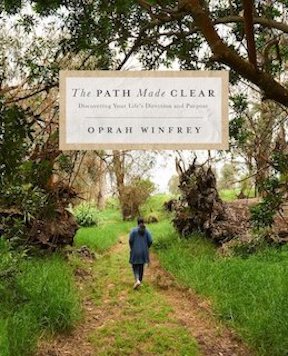
After that, I listened to the audiobook of Oprah Winfrey’s recent book “The Path Made Clear: Discovering Your Life’s Direction and Purpose,” which lays out in 10 chapters about how you can go about doing that. In part Oprah shares her own experiences and advice on living a life of significance and she interviews other renowned figures about their paths and beliefs.
I’ve never been an Oprah TV show follower, but I found the book pretty engaging and motivational though I’m not sure I got too many concrete tips out of it. Boiled down, it seemed a bit like such advice as: follow what you love and contentment will follow, or have faith and belief in who you are, or don’t let fear stop you etc. But there are various life lessons in it that I felt were well worthwhile visiting, and her guest stars of theologians, philosophers, authors, athletes, and celebs offered useful insights into life and one’s purpose pretty articulately.
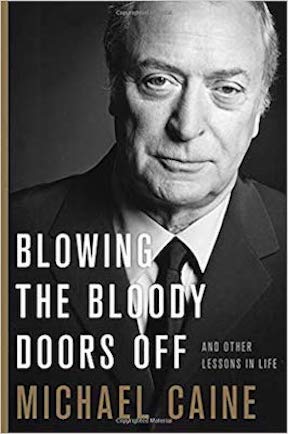
Next up, I read actor Michael Caine’s 2018 book “Blowing the Bloody Doors Off: And Other Lessons in Life.” (What is it with me and “lessons” this month?) I started it as an audio but then switched to the print version when the audiobook was due. I thought this book would be a memoir of his life in the movie industry, but it turned out to be just part memoir and part words of wisdom and advice to actors and others.
I didn’t really know much about Michael Caine’s poor working-class background, and his youth during WWII, but I enjoyed hearing about it in the first part of the book — along with finding out about his service in the Korean War. He’s an eloquent and charming storyteller.
The rest of the book jumps around quite a bit about his roles in movies —like how he got into acting in the 1960s, starting out small then getting his first breakout role in “Alfie” in 1966 — as well as the advice he has to share for others. Most of the tricks of the trade he shares seems to be wise common sense: such as be prepared and on time; know your lines inside and out; use the difficulty life throws you; do your research; stay focused; learn your craft; give 100 percent; be flexible and respectful of others; learn from your failures, etc. It’s all fine to read but towards the end the chapters seemed to get a bit repetitive.
Still Michael Caine includes some entertaining anecdotes but nothing too dishy and talks about actors he’s worked with and directors he’s liked, such as John Huston and Christopher Nolan. He speaks of his movie successes and duds (such as “The Swarm” from 1978) but he says he has no regrets. He seems respectful, hardworking, and grateful about his career and family. I’ve gone to renting a few of his movies to relive what he’s been in.
Recently I’ve seen him in “The Italian Job” from 1969, “The Man Who Would Be King” from 1975; “California Suite” from 1978; “Educating Rita” from 1983; and I plan to rewatch “Hannah and Her Sisters” from 1986, for which he won his first Academy Award. His second Oscar was for his role in “The Cider House Rules.” Certainly some of his movies seem quite dated, but still he comes off quite appealing and gifted. And by now, I almost have his cockney accent down. Which is your favorite Michael Caine movie?
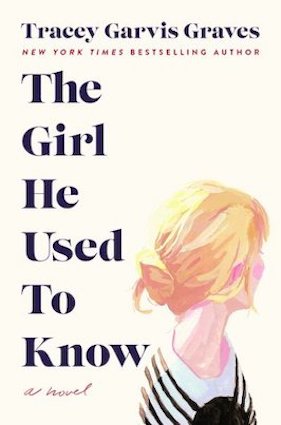
Last up, I listened to the audiobook of Tracey Garvis Graves’s recent novel “The Girl He Used to Know,” which by now having a title with “Girl” in it is almost enough to make one run. It was also a bit out of my typical range — more romance-y than I usually pick up, but I thought the storytelling was pretty engaging. It’s about two people (Annika and Jonathan) who re-connect after 10 years time and pick up where their relationship left off. They meet in college in 1991 at Illinois, date there, and then run into each other years later in 2001 in Chicago. The girl has a developmental disorder (I’d rather not say which) and learns how to navigate things in college with the help of her roommate Janice and the boyfriend Jonathan, who like Annika is on the chess team.
It seemed a bit hard to believe Annika’s parents didn’t test her or seek treatments for her when she was young, but otherwise the story seems to portray her pretty realistically. There is a touch of saccharine to the story and later a bit of melodrama, but still it made for a pretty enjoyable audiobook. As the story goes along, you begin to wonder how Annika and Jonathan will bridge their gap and get back together, and also what had happened in their past that broke them up to begin with. The author does well tying the story together and researching the character’s life and disorder. I like how Annika must overcome various challenges and grow along the way to reach where she wants to be.
That’s all for now. I will be away starting on Saturday — we are going on a bicycle trip in Montana with a group, so I hope it goes well. I won’t be back for a couple weeks … as we will take some time there afterwards. I look forward to chatting with you then.
Let me know if you’ve read any of these — and if so, what you thought.

My mother would probably love the Michael Caine book. I really liked The Girl He Used to Know.
Hi Kathy, apparently Michael Caine has written three memoir type books: in 1992, 2010, and 2018 so maybe those others are more complete on his life story. This one had quite a bit of advice in it. I’m glad you liked The Girl He Used to Know novel. It made for a good audio.
An interesting bunch of books. I thought that the Handmaid’s take was a brilliant book. I have not seen the series as I also think the characters ongoing grimness would be a bit hard to take. I have mixed feelings about Testament as I almost feel that the story should be left alone.
Night was indeed a disturbing but necessary book. I also have not read anything else by Wiesel but I really need to do so.
Have a great trip!
Thanks Brian, I hear what you’re saying about The Testaments. But I feel like The Handmaid’s Tale novel will still be able to stand for itself no matter what happens in the new one. I’m curious now about Wiesel’s other books in the trilogy Day & Dawn.
I hope you enjoy the Margaret Atwood event. I was lucky enough to meet her when she was in London a few years ago and treasure my signed copy of MaddAddam. I found her a bit intimidating, to be honest, but so intelligent and engaging.
Hi – thanks for stopping by! I can imagine meeting Atwood wouldn’t be easy, but it’s great that you got a personalized signed copy. I have not read all of her books but I have read about 5 or 6. I’ll stop by your site to see what you are reading.
Hey, you really branched out! It seems you got quite a bit out of it too. I saw Margaret Atwood in person once, a couple years ago. She was just the way I thought she would be but also confirmed for me that she may be the smartest female ever! Can’t wait for the new book. As far as successful people all saying similar things in their memoirs about how to get there, I guess it is probably true. There are no reliable shortcuts are there?
Have fun in Montana!
Thanks Judy. Who knows what awaits in Montana. As for your meeting Atwood — that would be awesome. 🙂 I bet her new book is chock full. It seems I took in a lot of “lesson” books recently but not sure anything will stick. I wish there were a shortcut on life’s purposes. Enjoy your week.
I love the smell of lilacs… such a nice photo of Stella, too! The new Atwood is already causing quite a stir. I hope to find time to reread The Handmaid’s Tale before it is released. Maybe the new graphic version. They’re not usually my thing, but who knows?
Quite an interesting mix of other books. I’ve not read Dawn or Day either, but have been curious about them for years. The Girl He Used to Know is one of the books on my ridiculously long library hold.
Enjoy your travels. Hope to see some pictures of the bike trip!
Hey thanks JoAnn, we just returned from our Montana bike trip and had a wonderful time. It was quite an adventure and I’m sure I’ll blog a little about it. I’ll stop by your site soon and see what you’re up to and reading.
That really is an eclectic set of books–I loved library wait lists 🙂
I’m with you on the TV version of Handmaid’s Tale – I stopped after season 1. It was good but so tense I really couldn’t bear to watch any more of it. I never read the book, and have mixed feelings about Atwood–some of her work I really like and others really are off-putting.
I heard an NPR interview with Michael Caine once and got the gist of his story from that–I enjoyed your review. I’ve always liked him as an actor and he’s done some excellent work.
Enjoy your bike trip to Montana – I don’t bike but I love to visit Montana. The Little Big Horn area is just breathtaking.
Hi Jane: thanks for your comments. Yeah we just got back from Montana and it was beautiful there, wow! Such scenery! I’m sure to blog a bit about the trip soon. Hope you are enjoying your reading. I agree, the TV version of The Handmaid’s Tale was too grim & stressful for me to watch anymore either.
I am back in town and just trying to catch up with my blog reading. You are probably back from your bike trip already! Montana is lovely this time of year.
You really did read out of your comfort zone! I love Caine though.
Hi Ti, glad you are back. We just got back too, today. So I need to catch up. Montana was very beautiful. So many scenic mountain ranges & rivers it was amazing there; I will blog something about it soon. Yeah I agree about Michael Caine … he’s usually a hoot … and very good in his roles. His accent & voice are recognizable anywhere!
Great list of books, Susan. Thanks for leaving me the link. I think Night should be read by everyone, it is one of the most important books I ever read – and I read a few …
I have also read The Handmaid’s Tale and am quite envious that you got to see Margaret Atwood, of whom I’ve also read a few more books. Must have been fantastic.
I have not watched the tv series at all since I cannot believe it can be made into a film like I would like it. 😉